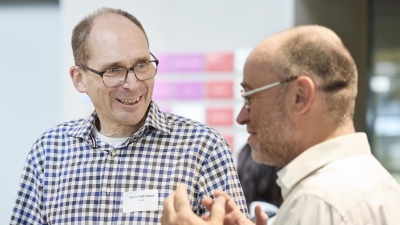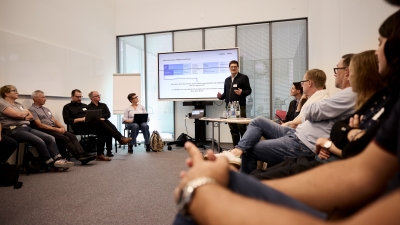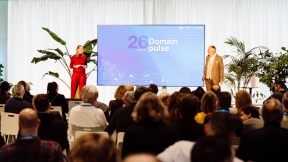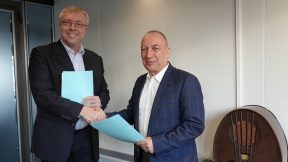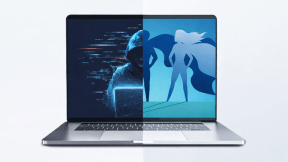Switch and Educa: What’s next with digital identities?
How do we use digital identities from kindergarten to university and beyond? At Educa25 on 3 September in Bern, experts from the fields of education, administration and business discussed the impact of digital identities on education. One of the key questions was: How can we further develop the interaction between Switch edu-ID and Edulog?
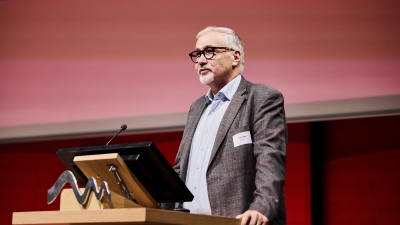
In brief
- Digital identities are a prerequisite for digital mobility across all levels of education.
- Individuals must be able to exercise self-determination over their digital identities.
- Switch and Educa are therefore working together to further develop digital identities.
- The potential of the state-issued e-ID will be harnessed in Switch edu-ID and Edulog.
Developing an awareness of digital identities
‘I click, therefore I am?’ – this was the motto of Educa's annual conference at the Zentrum Paul Klee in Bern. The focus was on how digital identities are created, how we use them and what impact they have on education. Switch was represented by Esther Seidl-Nussbaumer as a speaker and Christoph Graf in a practical workshop. It became clear that technology alone is not enough to address this issue. The decisive factors are how we take ethical and cultural aspects into account and how we as individuals deal with our digital identities. Those involved in education have the task of creating the necessary framework for individuals to thrive. The interaction be-tween Switch edu-ID and Edulog is designed to support precisely this task.
Promoting digital mobility
Esther Seidl-Nussbaumer put the focus on individuals. She asked the fundamental questions of digital transformation: Who am I in the digital space? How does my identity come about? How do I prove it – and protect my personal data at the same time? At university level, Switch edu-ID is already established as a lifelong digital identity, while Edulog provides access at primary and secondary level. The added value in the Swiss education sector is achieved by linking both systems. This will create a seamless educational pathway for learners from kindergarten to university. Today, Switch edu-ID is already internationally compatible thanks to its integration into the edugain federation. This promotes the digital mobility of students by giving them access to inter-national resources.
But technology is only a means to an end. The true yardstick is digital self-determination over one's own digital data. Individuals must be able to decide for themselves to whom they disclose which personal data and for what purpose. Together with all stakeholders, we must develop awareness of this and promote the responsible use of digital identities. Esther Seidl-Nussbaumer therefore concludes with the invitation: ‘Let's work together to build a networked, mobile and sovereign educational landscape.’
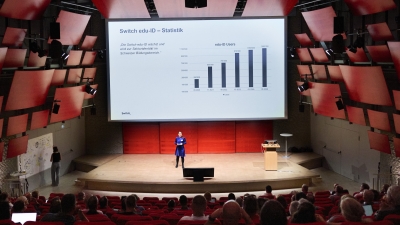
What’s next with Edulog and Switch edu-ID?
Christoph Graf from Switch, together with Andreas Klausing and Karl Wimmer from Educa, showed how the two identity systems can interact in a practical workshop. Their goal is to create a trustworthy identity landscape that accompanies the individual learning path – from nursery school to university to further education.
One joint project that demonstrates the advantages of this connection is the digital baccalaureate certificate. Every year, more than 40,000 new students enrol at a university. The authenticity of their baccalaureate certificates no longer has to be checked manually, which is a laborious process. The potential for cost savings and time savings for both universities and new students is enormous. At the same time, the question arises as to how we deal with cultural rituals, such as the ceremonial presentation of baccalaureate certificates, which play an important role in the educational process.
Harnessing the potential of digitalisation
At the end of the symposium, Educa and Switch emphasised that digital identities are much more than technical tools. They shape the way we move within the educational space and prove our affiliation and learning achievements. While René Descartes understood "I think, therefore I am" as the basis of our existence, the conference showed that in the digital educational space, clicking – i.e. the conscious use of one's own identity – is increasingly becoming a key to digital participation.
Today, Edulog and Switch edu-ID offer solid solutions in which self-determination is integrated by design. Together, we are expanding these identity solutions into an infrastructure that encompasses all education sectors and, in the case of a state-issued e-ID, also leverages its potential.
About Switch's contributors
Esther Seidl-Nussbaumer, Head of Business Innovation & Product Management, Switch
Esther Seidl-Nussbaumer has a master's degree in biochemistry and an eMBA in international management. Her particular interest in neurochemistry has helped shape her career path from the pharmaceutical industry to the digital education context at Switch: ‘The two topics of health and education are inextricably linked.’
Christoph Graf, Programme Manager Switch edu-ID, Switch
Christoph Graf has been working with digital identities for over twenty years. He was one of the architects of Switch edu-ID, the universal login for lifelong learning in the education, research and innovation community. His current challenge is to further develop Switch's identity services towards user centricity and self-sovereignty.
Additional links
Collaboration with Educa for digital mobility
